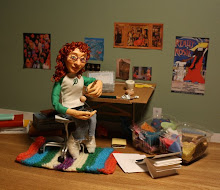A quick note about English language books for the UK: they are published in paperback and then go to hardcover! Isn’t that ingenious? I would spend so much more money on books if they were initially released in paperback as I’d buy copies right when they came out, instead of getting them from the library and then buying them only if I absolutely adored them and they were already in paperback and I happened to have a coupon. Why the US hasn’t picked up on this, I’ve no idea. Come to think of it, advance reader’s copies are always in paperback anyway…
Wednesday, November 25, 2009
The Wild Things
I have not yet seen the film version of Sendak’s Masterpiece Where the Wild Things Are. But in Paris I picked up a copy of Dave Egger’s The Wild Things- a book about a movie about a book. And I was incredibly disappointed. Who, exactly, does he think he is writing for? Not me, not anyone I can think of. There were all sorts of uncomfortable moments, difficult issues, not to mention violent moments and parts that seemed sexual (almost like a modern Red Riding Hood). I’d prefer not to pull apart the story and explain this more fully- I’d rather just forget the book. And so, while I was looking forward to the movie, I am now avoiding it. The only thing that could bring one to pick up this book is the McSweeney’s Packaging- it’ll get you every time.
The Inheritance of Loss
After devouring Anathem in Italy, I arrived in Paris with nothing but a guidebook to read. My friend Valentine lent me Kiran Desai’s The Inheritance of Loss, having already read and loved it. The first chapter is poetry. If you trust me, find the book, read the first chapter, and don’t read the rest of this post.
Okay. For those of you who simply must know more, The Inheritance of Loss (winner of the Man Booker Prize 2006) follows a few stories: that of a young Indian man working under the table in New York. His father, left back in India, takes care of an Indian judge who doesn’t feel at home in England nor India. The Judge’s granddaughter who comes of age amidst civil unrest. The characters are human, each has major flaws, but you wish them the best despite this. Their wishes and dreams, regrets and sins are so unique, perfectly connected to their stories. You will fall in, and emerge, gasping, at the end.
Neal Stephenson's Anathem
I left for a two month trip to Europe, taking only Neal Stephenson’s Anathem with me. As Cryptonomicon had taken me two months, I figured I’d be fine with just Anathem. I was in for a rather large surprise when I finished it in two weeks (it’s all that train time and decompressing after museums).
Anathem is more easily categorized as science-fiction than many of Stephenson’s other books- and this can only be seen as a compliment. Like Stephenson’s other books, Anathem uses religion, philosophy, and mathematics as an integral part of the novel. His exploration of such concepts is common in science-fiction, but Stephenson makes philosophic conversation more important than most other authors. But where this novel moves away from his others into the realm of sci-fi is his inclusion of aliens. Aliens? Do these not sound a bit strange for a Stephenson? Yes, they do. But his characterization of them is so perfect for the world he creates, there is no need to suspend disbelief, for by the time the aliens appear we have already questioned so much of the world through philosophical passages that we are ready to accept, question and learn. Not wanting to take away from the experience of reading, I will not say more, except that this is a wonderful introduction to Stephenson for sci-fi readers, and an interesting new novel for those already following his work.
